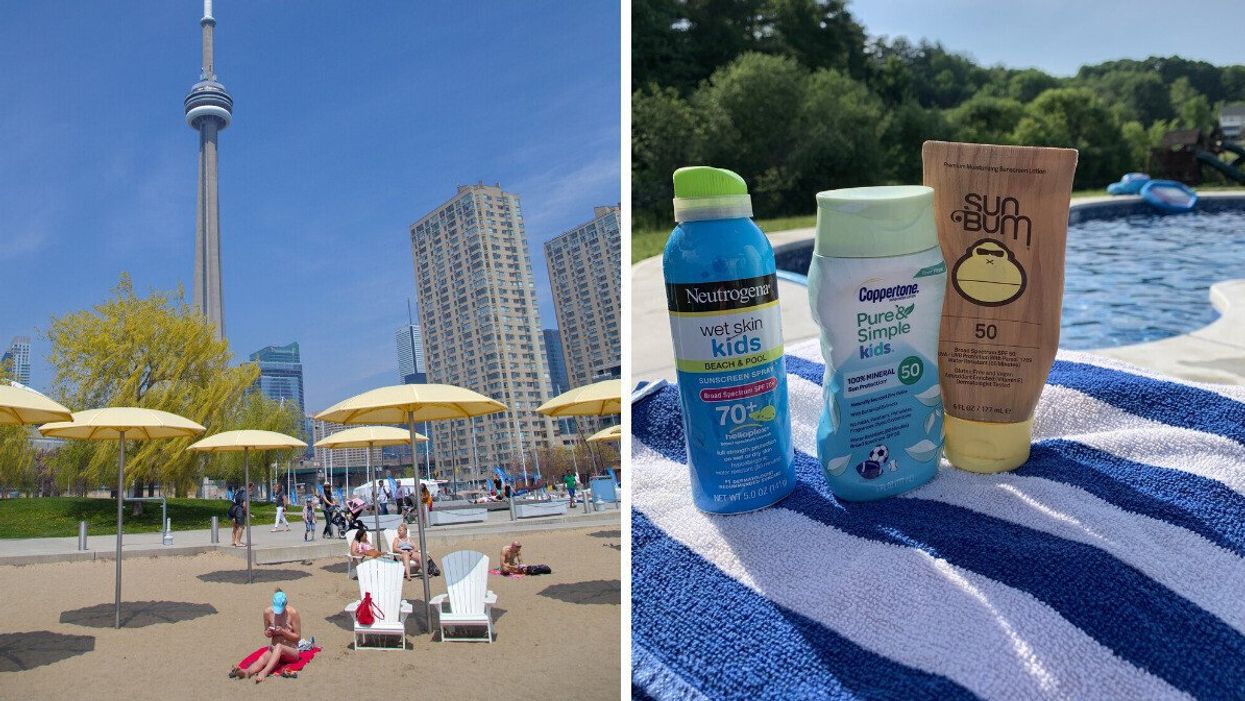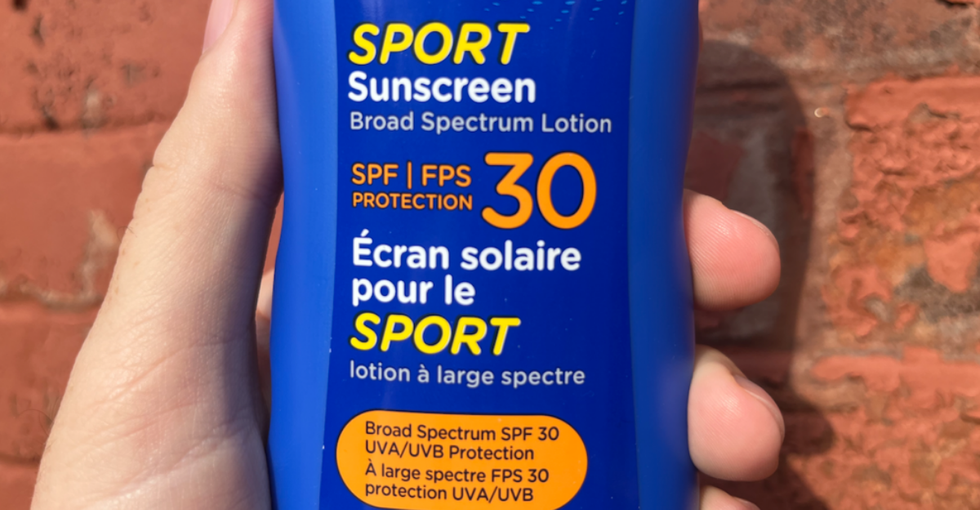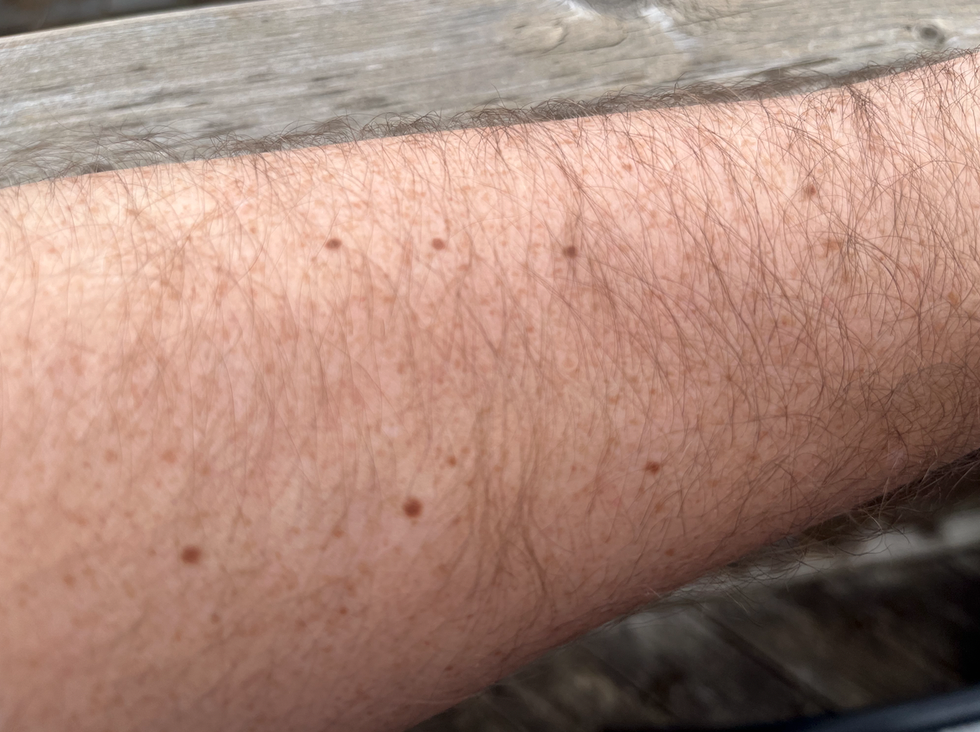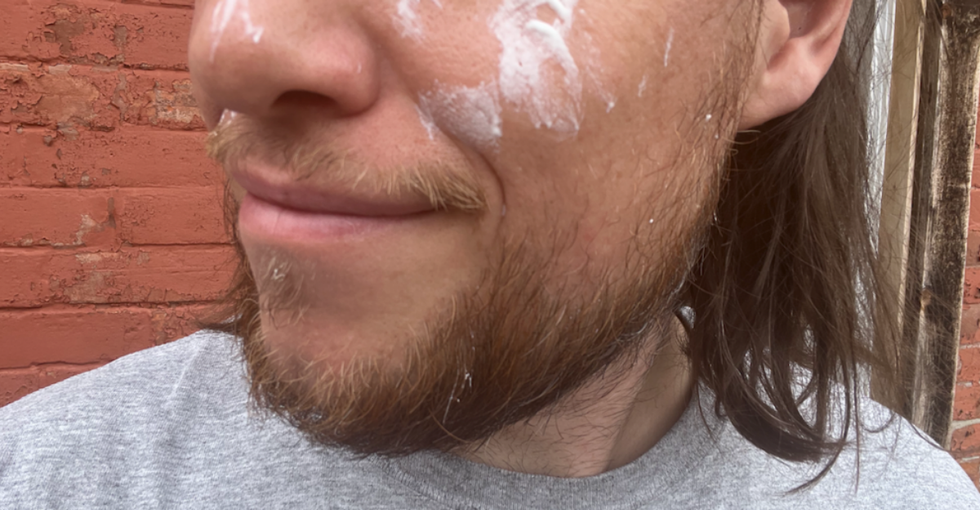What Type Of Sunscreen To Use, How Often To Reapply & Other Things You Need To Know
We asked an expert to clear up the top sunscreen myths & misconceptions

A sunny day at Toronto's Habourfront Quay. Right: Bottles of sunscreen on a towel in front of a swimming pool.
Fact: Sunscreen is an important part of your daily skincare routine — which means that picking the best sunscreen and SPF for your lifestyle and skin sensitivity is crucial to having a good time in the great outdoors this spring and summer.
On one hand, lathering up is an act of survival. Prolonged exposure to the UV rays from the sun can lead to adverse health outcomes later in life. That includes skin cancer — the abnormal growth of skin cells — which is both deadly and one of the most easily preventable forms of cancer. (Narcity's own Asymina Kantorowicz has previously detailed what she wishes she knew before her own skin cancer diagnosis.)
And besides the long-term risks, a nice lobster-red sunburn is going to feel like hell in the middle of what's forecasted to be a sizzling summer in Canada.
But that's not all! Even if the grim spectre of cancer and the short-term risk of a burn are dwarfed by your singular focus on nailing a perfectly even tan, there's another great reason why the vanity-minded should use protection this summer.
"The number one anti-aging secret is wearing sunscreen," Dr. Renita Ahluwalia, lead dermatologist at the Canadian Dermatology Centre, told Narcity in a phone interview this week.
I presented her with some of the most frequently asked questions — and misconceptions — about sunscreen in our chat: Here's what the skincare expert had to say.
Should I apply sunscreen every day?

A bottle of sport sunscreen advertising "Broad Spectrum SPF 30 UVA/UVB Protection."
According to Ahluwalia, there are no days off for wearing sunscreen — not even on cold or rainy days when the strength of the sun isn't particularly evident.
"The most important advice that I give to all my patients is that 365 days a year, you should wear sunscreen," she says. "The sun's rays go through cloud cover. They go through on rainy days. They reflect off the snow. So it's really important to wear sunscreen every single day."
What type of sunscreen should I buy & what's the best SPF?
Not all UV rays are the same. For instance, Ultraviolet A (UVA) has longer wavelengths and is linked to skin aging, whereas Ultraviolet B (UVB) features shorter wavelengths and are the rays that cause sunburns, according to the Skin Cancer Foundation. To protect yourself against both, look for sunscreens that have "broad spectrum" on the label.
"As a general rule, you want a broad spectrum sunscreen with at least an SPF 30" — which, if applied thoroughly, will protect your skin against most of the sun's rays, according to Ahluwalia.
She also recommends sunscreen that contains a blue light filter.
"There's more evidence now that blue light causes oxidative damage to the skin which can lead to more signs of aging and brown spots," Ahluwalia says. "So that's another reason to wear it every single day."
How much sunscreen should I use?
Let's put it this way: You're better off applying just enough sunscreen correctly than going overboard, but missing spots. As it turns out, the rule of thumb is actually a rule of fingers.
"For the face, we say a 'Two-Finger Rule.' So you put the sunscreen in two lines on your index and middle finger, and that's how much to apply to your face and neck," Ahluwalia says. "And then for the body, the right amount is a shot glass amount.
"If you're using the right amount, and you're spreading it thoroughly, then that's probably all you need."
How often should I reapply sunscreen?

Birthmarks on a pale, hairy arm.
It's not enough to only apply sunscreen at the start of the day. Ahluwalia says to reapply sunscreen after swimming or sweating, and every couple of hours as a general rule.
What type of sunscreen should I use on my face?
Not only does your face experience the most year-round exposure (unless you own a high-SPF balaclava) but its skin is already quite sensitive to begin with.
"Often, my patients invest in a sunscreen that contains higher quality ingredients and ingredients that are less prone to breakouts or irritability issues for the face and the neck," Ahluwalia says.
Generally, you can be a little less selective with sunscreen for your body since the skin is less sensitive — though you'll want to find a sunscreen that best suits your needs.
How early before working out should I apply sunscreen?

A man with sunscreen unevenly spread across his face.
If you're planning on any sort of sweaty or wet activity — think jogs, hikes and swimming — it's a good idea to give your skin a little extra time to absorb the sunscreen.
"Usually, just as a general rule of thumb, I say apply 15 minutes before exposure," Ahluwalia says. "But the truth is, a lot of the sunscreens work as soon as you apply them these days."
For those looking for extra peace of mind for their beach day, look for the "water resistant" and "very water resistant" labels; these sunscreens hold their SPF for 40 and 80 minutes of submersion, respectively.
Do I need to use sunscreen if I have darker skin?
The short answer is, yes. Though people with light complexions burn easier than those with darker complexions "sunscreen is important for people of all different photo types, from the very lightest to the very darkest," Ahluwalia explains.
She adds: "Certainly, people with fair skin will burn easier, and they're more predisposed to skin cancer... (but) people with more melanated skin are more prone to disorders of pigmentation and uneven skin tone."
Plus, even if you're less likely to suffer a sunburn than your pal, you're both equally at risk of sun damage triggering the premature signs of aging.
Let's face it — you probably aren't wearing sunscreen right now. According to the experts, you definitely should be.
- I Was Diagnosed With Skin Cancer & Here's The Expert Advice I Wish I'd Known Sooner ›
- Canada's Summer Forecast Is Out Already & There Will Be 'Unrelenting' Heat Reaching Almost 40 C ›
- A Popular Spray-On Sunscreen Is Being Recalled & It May Contain A Cancer-Linked Chemical ›
- Tick Season Could Be Starting Earlier This Year & Here's How To Prevent Tick Bites - Narcity ›
- These Are My 5 Tried And Tested Spots To Buy Korean Skincare & Makeup In The GTA (PHOTOS) - Narcity ›
- I Had Mohs Surgery To Treat Skin Cancer & Here's What Surprised Me Most About The Procedure - Narcity ›
- A High SPF Sunscreen Does Not Mean More Protection For Your Skin & Here's What Works Best - Narcity ›
- 7 Toronto Salons Where You Can Get A Stunning Spray Tan Under $65 Without The Sun Damage - Narcity ›